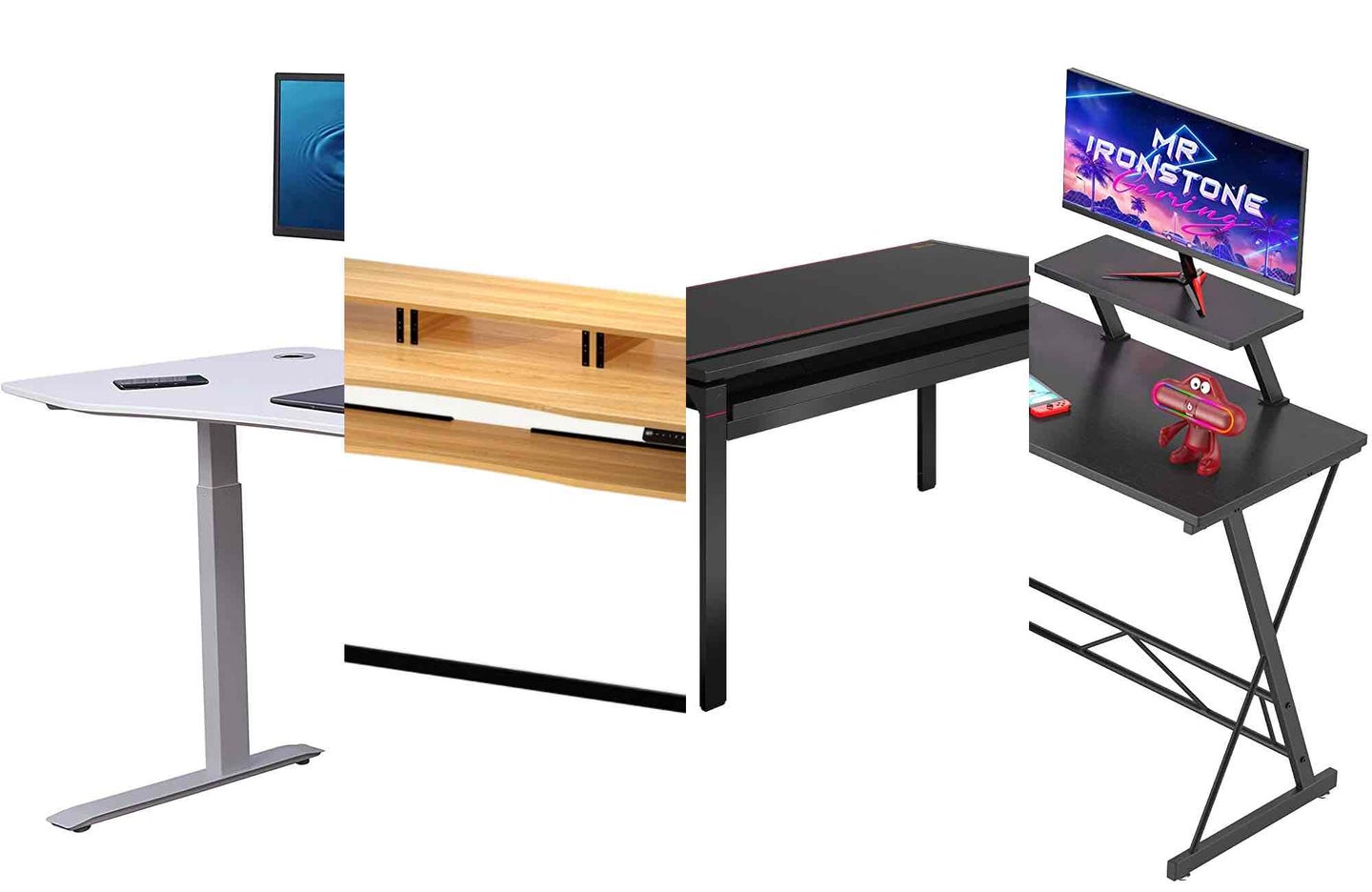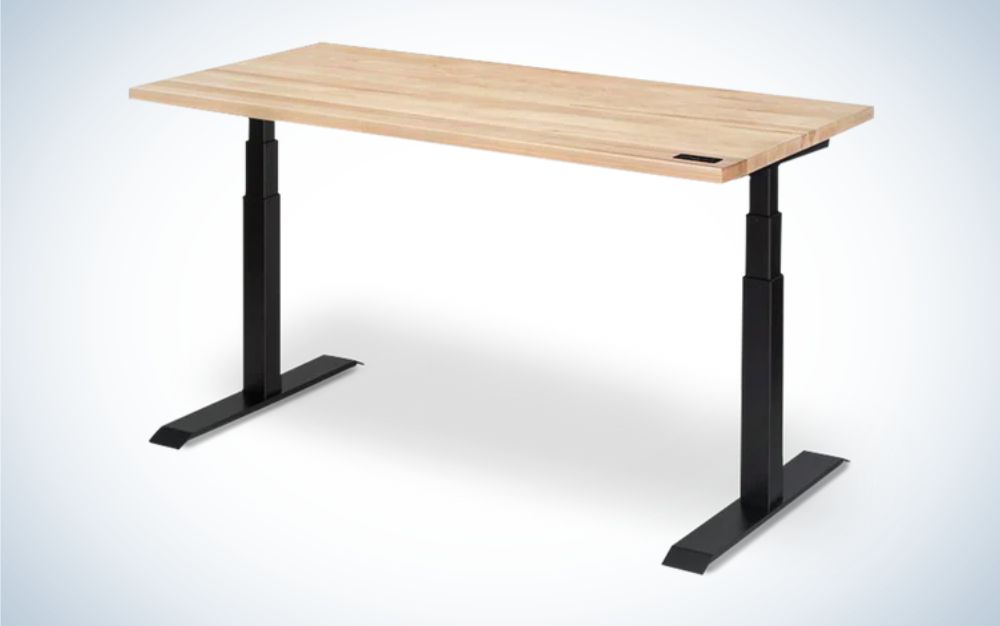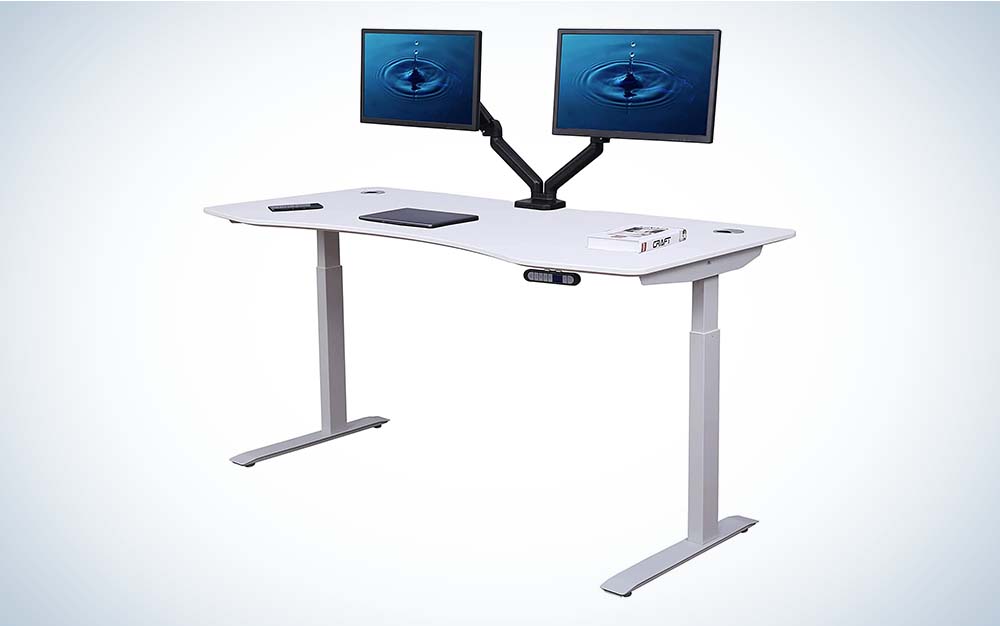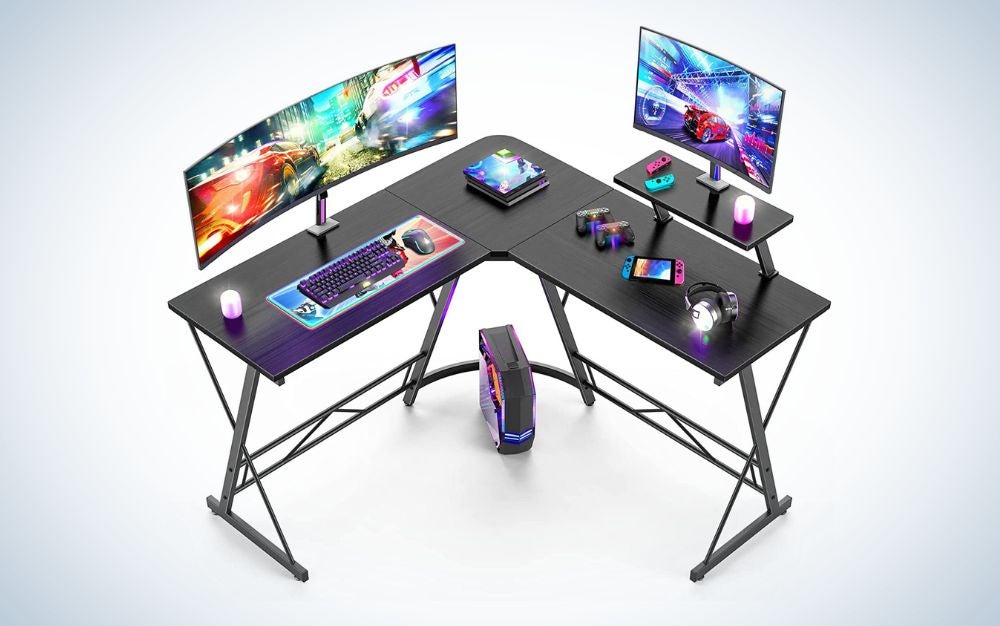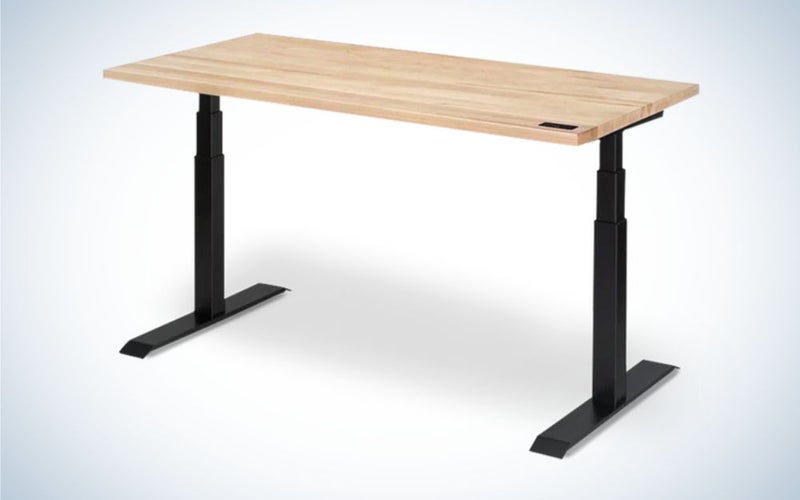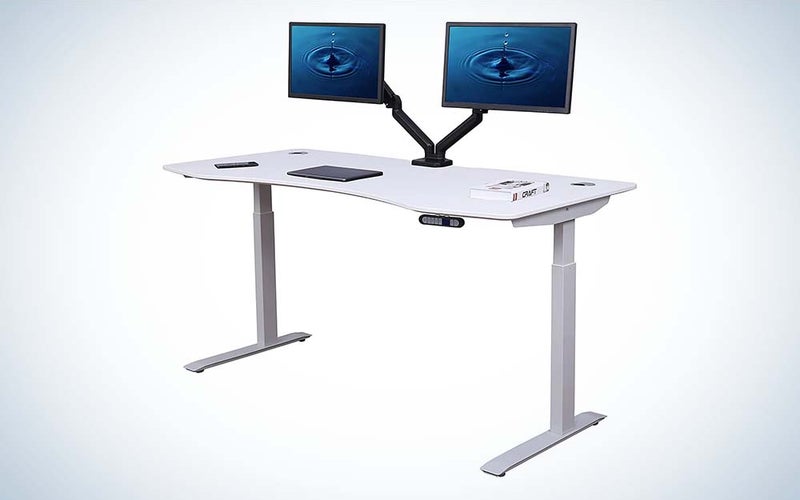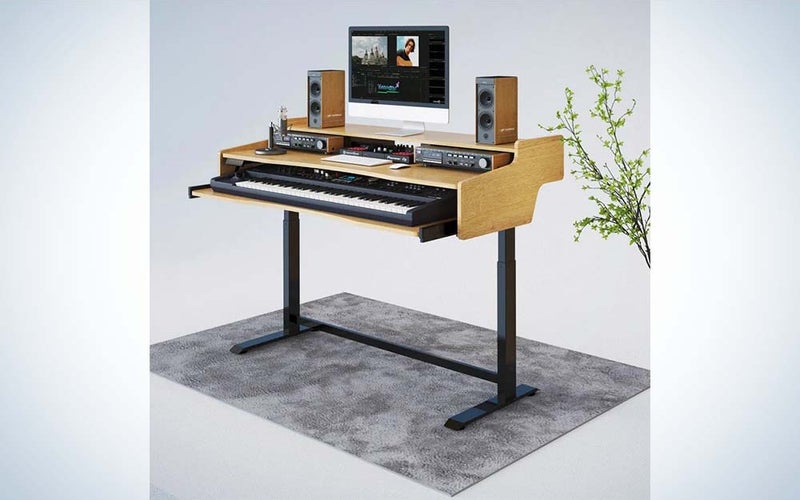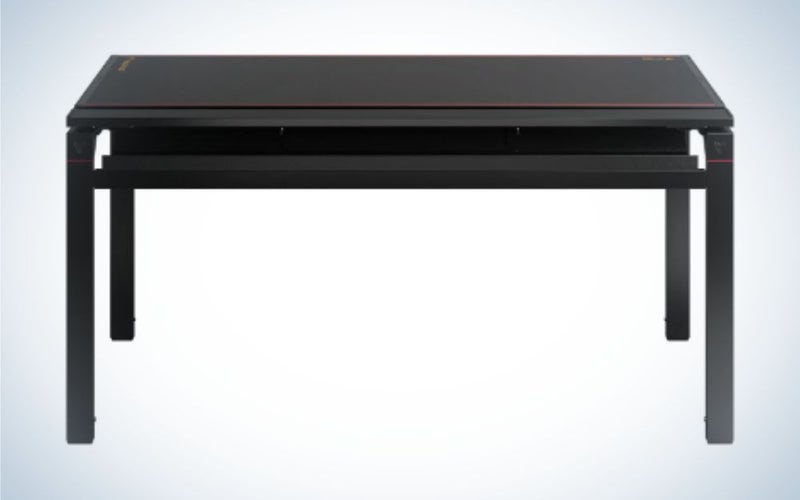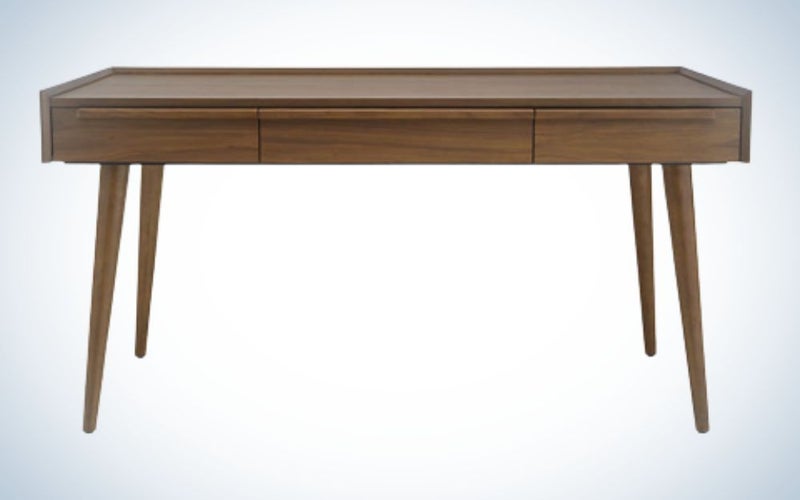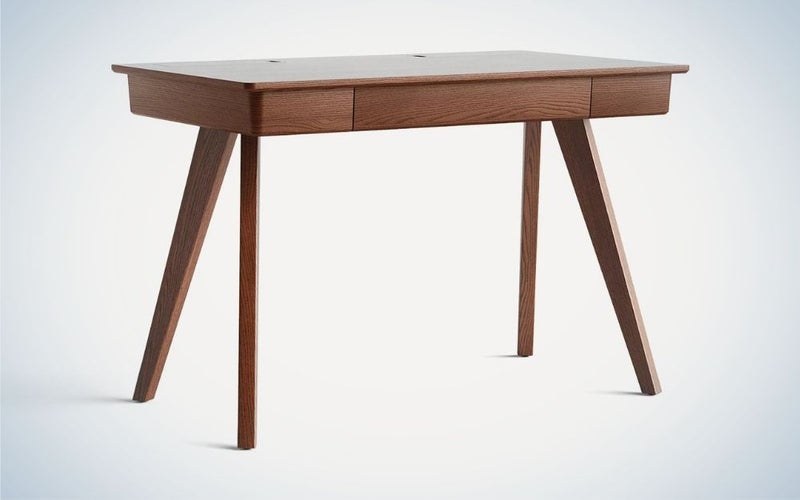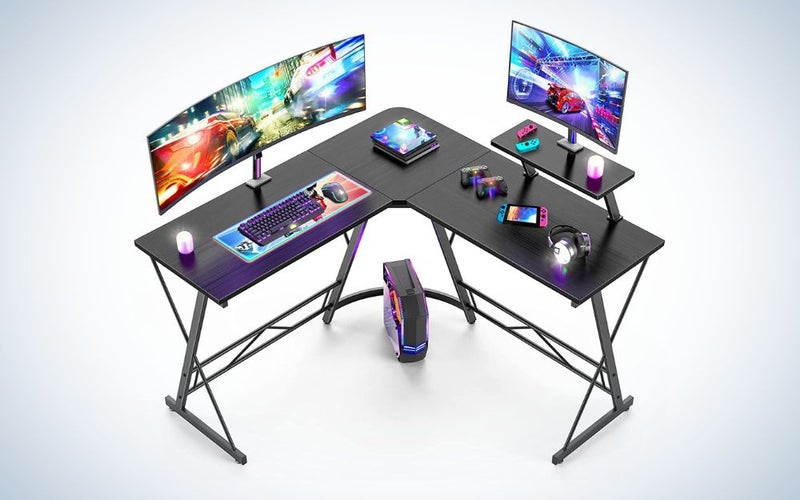We may earn revenue from the products available on this page and participate in affiliate programs. Learn more ›
A dual monitor setup is a godsend for multitaskers who run several apps side by side. Of course, setting up a workstation with dual monitors presents more challenges than a simple PC and monitor: You need something large, sturdy, and, ideally, a flat surface that pairs well with a pair of monitor arms. It can be a delicate balancing act. Luckily, we’re here to help you get it right. The best desks for dual monitors can fit into any kind of workflow and aesthetic—seated or standing, productive office or gaming battlestation.
- Best overall: Ergonofis The Sway
- Best standing: ApexDesk Elite Series Adjustable Standing Desk
- Best for music production: Flexispot Studio Standing Desk ESD 101
- Best gaming: Secretlab Magnus Metal Desk
- Best home office: Crate & Barrel Tate Walnut Desk
- Best small: Burrow Pilot Desk
- Best budget: Mr Ironstone L Shaped Desk
How we picked the best desks for dual monitors
I’ve covered gadgets and home office gear for over 10 years for publications like Popular Science, CNN Underscored, and Gear Patrol. For seven of those years, I commuted to an office where I used a dual monitor setup. In addition to drawing on that experience, I consulted peer recommendations, critical reviews, user impressions, and PopSci’s exhaustive coverage of office furniture, including the best ergonomic desks and the best standing desks, plus conducted independent research into home office setups to see what works for people and what doesn’t.
The best desks for dual monitors: Reviews & Recommendations
There isn’t all that much to picking a desk with dual monitors in mind. It needs to be wide. It needs to be sturdy. It needs to have a flat lip in the back. Everything else is gravy.
Our picks are wide enough to accommodate two monitors, with plenty of space leftover for your keyboard, mouse, and everything else you want on your desk. A few of our picks offer more modern amenities that will fit well with your technology and various gadgets, while the others feature more classic, tried-and-true designs.
Best overall: Ergonofis The Sway
Ergonofis
Why it made the cut: The Sway is a handmade standing desk that features programmable buttons, cable management accessories, and more for a clean, modern design.
Specs
- Dimensions: 60 x 30 x 22.7 (WDH)
- Adjustable height range: 22.7-48 inches
- Weight: 70 pounds
Pros
- High-quality materials inform polished design
- Appealing add-ons and accessories
- 300-pound lifting capacity
- Lets you store standing and seated heights
Cons
- Expensive
Handmade using locally sourced wood, The Sway from Quebec-based manufacturer Ergonofis is an incredibly elegant, modern standing desk. Available in three different solid wood finishes—including a beautiful walnut and a more earthy-toned maple—the Sway offers motorized height adjustment, so you can switch from sitting to standing at any time. It has a max lifting capacity of 300 pounds—enough to hold your dual monitors, a desktop PC, and whatever else you want to stash on your desk surface. You control the desk’s height using a slick inset touch screen, which lets you program two heights so you can switch between sitting and standing with a single tap.
Ergonofis makes a fairly wide array of polished add-ons that maintain the desk’s beautiful look, including a few cable management options, a desk drawer, and a desk shelf that can fit two monitors. If you’re looking for a modern desk that’s customizable and is compatible with a host of accessories, The Sway desk from Ergonofis is an excellent choice.
Best standing: ApexDesk Elite Series Adjustable Standing Desk
ApexDesk
Why it made the cut: ApexDesk’s Elite Series Adjustable Standing Desk gives you the flexibility you need.
Specs
- Dimensions: 60 x 27 x 48 inches (WDH)
- Adjustable height range: 29-49 inches
- Weight: 49.9 pounds
Pros
- Curved design
- 20 hours of height adjustability
- Built-in cable management
Cons
- Simple look
It may not look as nice as some of our other recommendations, but ApexDesk’s Elite Series is highly functional and easily accommodates a couple of screens. Its height-adjustable design allows you to switch between any height between 29 and 49 inches and set four preset heights when you find ones that work for you. The desk can also support a hefty 235 pounds, making it a solid choice for users with a lot of gear on their desks.
Earlier models of this desk didn’t come with any cable management, but ApexDesk updated their design to build it in. Two holes on the upper right and upper left sides of the desk make it easy to snake cords from above and below the desktop. If you have a lot of tech accessories, this cable management system will keep the top of your desk clean.
While it lacks the luxurious locally sourced wood, the ApexDesk’s Elite Series Adjustable Standing Desk costs substantially less than most of our other recommendations. If you want to upgrade to a substantial standing desk but don’t want to spend over $600 on a showpiece desk, it is an excellent choice.
Best for music production: Flexispot Studio Standing Desk ESD 101
Why it made the cut: With a tray for an 88 keyboard, space for an equalizer, amp, speakers, and two monitors, this versatile desk is perfect for musicians and podcasters alike.
Specs
- Dimensions: 63.4 x 32.6 x 6.6 inches (LWH)
- Adjustable height range: 28.5 inches to 48.2 inches
- Weight: 110 pounds
Pros
- Room for 88 keyboard
- Space for two monitors, amp, speakers, and more
- Anti-collision technology to protect expensive equipment
Cons
- On the smaller side for dual monitors
Music production can require a lot of equipment, and you need it to be close at hand. FlexiSpot has come up with a solution that will make the process easier for pros and amateurs alike. Made of maple wood with a metal base, the Studio Standing Desk comes equipped with room for all the essentials: an 88 keyboard tray, a shelf with space for two monitors and speakers, room for an equalizer and amp, and more. Plus, you can raise or lower the desk at the touch of a button, so long hours spent mixing don’t have to be long hours spent sitting. And it’s designed with anti-collision technology to keep expensive equipment safe.
Best gaming: Secretlab Magnus Metal Desk
Secretlab
Why it made the cut: With a stealthy all-metal design, RGB light strip, and cable management tray, the Magnus from Secretlab is the perfect complement for your gaming setup.
Specs
- Dimensions: 59 x 28 x 29 inches (WDH)
- Adjustable height range: N/A
- Weight: 92.6 pounds
Pros
- Sleek design with built-in RGB lighting
- Excellent build quality
- Cable management system
Cons
- Accessories can make the total package expensive
A gaming desk is more than a place you put your desktop and monitors; its design should enhance your gaming experience. The Secretlab Magnus’ all-metal construction and magnetic modular upgrade system make it perfectly upgradable, just like your gaming PC. Its comparatively robust range of add-ons includes a magnetic leatherette desk mat, cable anchors, and headphone hanger. The stealthy, sleek design lets meld with the peripherals and other components of your system. It even features a built-in RGB strip, which you can customize or sync to other elements of your setup.
Best home office: Crate & Barrel Tate Walnut Desk
Crate&Barrel
Why it made the cut: The Tate desk features three solid poplar drawers, an integrated power strip with two outlets, and two USB ports.
Specs
- Dimensions: 60 x 30 x 30.75 inches (WDH)
- Adjustable height range: N/A
- Weight: 120 pounds
Pros
- Clean vintage design
- Integrated power strip
- Three drawers for storage
Cons
- No built-in cable management
- Rear edge is too thick for desk-mounted monitor stand
If you just want a really nice desk that happens to be big enough to support a dual-monitor setup, there are a ton of options for you. As a jumping-off point for your conventional office desk search, we like the Tate desk from Crate & Barrel. It features elements of vintage and modern style, creating a clean, mid-century design. It’s clean, sturdy, and versatile, allowing it to fit in with any decor.
At 60 inches wide, the Tate is also a sprawling desk with plenty of room for a dual-monitor setup. Though it lacks some of the monitor-specific flourishes in some of our other picks, it has a few tech-focused tricks, including an integrated power strip on the underside of the desk to minimize the number of cables running from it. It isn’t a special, PC-optimized desk, but it’s a handsome, versatile piece of furniture.
Best small: Burrow Pilot Desk
Burrow
Why it made the cut: The Pilot Desk from Burrow features a spacious drawer, cord management compartments, and a hidden opening to let you mount a monitor arm.
Specs
- Dimensions: 43 x 27 x 29 inches (WDH)
- Standing desk height range: N/A
- Weight: 85
Pros
- Mid-century modern design
- Spacious drawer for peripherals
- Cord management compartment
Cons
- On the smaller side for dual monitors
The Pilot Desk from Burrow is compact compared to our other picks but it’s difficult to resist its charm. The mid-century modern-style Pilot Desk looks like a vintage piece, but features a bunch of small, modern flourishes that make it perfect for anyone who appreciates classic furniture design, but needs the modern conveniences of a PC-ready desk.
Specifically, the Pilot has cord management compartments, and removable wooden plate to reveal a hidden monitor arm mount. It also comes furnished with a bottom drawer, which many of our picks only offer as an add-on. To bring it all together, the Pilot Desk features drafting table-style legs, meaning it’s always dressed for success even if you’re not during your next meeting. There’s also a standing version of the Pilot Desk with the same design and amenities if that’s more your speed.
Best budget: Mr. Ironstone L-Shaped Desk
Mr IRONSTONE
Buy it used or refurbished: eBay
Why it made the cut: The L-shaped desk from Mr. Ironstone is a simple, affordable way to give yourself a ton of desk space.
Specs
- Dimensions: 50.8 x 18.2 x 29.53 inches (WDH)
- Standing desk height range: N/A
- Weight: 40.79 pounds
Pros
- Affordable
- Space-saving design
- Adjustable feet
Cons
- Limited depth
This L-shaped desk from Mr. Ironstone is simple, clean, and durable enough to support up to 100 pounds—more than enough to hold two monitors. The desk is made from P2 MDF board and a sturdy metal frame and it comes with a laminated finish that’s easy to clean. It also comes in several colors, from black to rustic brown, and features adjustable feet, so you can keep it stable on uneven surfaces. L-shaped desks are great space savers and the L-shaped desk from Mr. Ironstone offers a simple solution at an affordable price.
Things to consider when choosing the best desks for dual monitors
Aside from your computer, your desk is an essential part of your setup; it’s where you’ll spend hours of your day. That’s why finding a desk that fits your needs is so important. To accommodate two monitors, you need a wide desk, so it doesn’t feel like your setup is cramped.
If you have room in your space, we recommend using a desk that’s at least 55 inches wide to accommodate a dual-monitor setup, and at least 30 inches deep to ensure you have as much desk space as possible. In a smaller room, you could scale down to 48 inches wide and 24 inches deep. At 48 inches, your monitor may likely span the entire width of your desk.
We also strongly recommend picking up either a desk-mounted dual-monitor stand or two desk-mounted monitor arms, which will help maximize your desk space and improve your PC’s ergonomics.
Reminder: It’s hard to overspend on a desk
Furniture is an investment. We all buy bargain furniture from Ikea or Walmart every now and again but you will likely need to spend hundreds or even thousands of dollars to get a stable desk that will look good and last a long time. A well-made desk, constructed from good materials, should be something that you can use for your whole life.
Our selections run the gamut of prices, from just over $100 to nearly $2,000. All of them are solid but ultimately have different reasonable lifespans based on how they’re built, which often corresponds to their cost. When checking out a desk, consider what it’s made from and how it’s constructed. If it requires assembly, check the company’s customer service and warranty policy. A company that uses good materials and stands by its products is far more likely to make a desk worthy of becoming the centerpiece for your setup.
Standing desks
Several studies suggest sitting for long periods can result in everything from heart disease to diabetes. Using a standing desk can help mitigate the negative effects of spending your work time at a desk day in and day out. There are many types of standing desks, ranging from stands that “convert” a conventional desk into a standing desk, permanently tall desks, and height-adjustable desks that can shift from seated to standing height and back, either manually using a crank or automatically via a built-in motor.
A good standing desk setup allows you to alternate between sitting and standing throughout the day. Experts increasingly agree that standing for extended periods of time creates long-term health problems, just like sitting all day. To truly optimize your desk setup for your health, we recommend using a height-adjustable desk. While a manual option, including a stand that stacks on a seated desk, will work for some people, users with a heavy PC setup should opt for something motorized. You can change between standing and seated positions easily.
A motorized height-adjustable desk also allows you to adjust your seated position precisely, which is also important for overall office ergonomics, according to the Mayo Clinic. Ideally, you should adjust the height of your chair so your knees are about level with your hips. Your wrists should also be straight, with your hands at or below elbow level. Your monitor should also be about an arm’s length away and the top of the screen should be at or slightly below eye level.
If you decide to pick a motorized standing desk, check and make sure its motor is powerful enough to accommodate the full weight of your setup, including your monitors. A pair of displays will likely put somewhere between 25-40 pounds on your desk, and that’s without factoring in a stand or stands. Regardless of the design, do not exceed the specified weight limit for your desk.
Convenient additions
Many new companies, especially those who make desks designed specifically for computers, offer additional attachments and accessories to enhance your desk, depending on your needs. For example, you can add a desk drawer and cable management shelf to our top pick, the Sway by Ergonofis. On the one hand, these add-ons are made for the specific desk you’re buying and often help address common needs, like additional storage. On the other, they usually cost extra, making an expensive piece of furniture even pricier. Also, you may be able to find third-party alternatives for some common upgrades, which will cost less, but may not work as well or look as good.
We recommend taking a good, hard look at the available upgrades and your setup to see what additions make sense for you. We can’t categorically say that they’re good or bad, just that they can only solve a problem if you have a problem to solve. Again, we recommend thinking about a desk as a long-term investment: You want to get something that comes as close as possible to perfectly fitting your needs.
FAQs
Q: How much do desks for dual monitors cost?
As you can see from our list, desk prices span from just over $100 well into the thousands. A basic desk made from cheap materials shouldn’t cost much, but has a life expectancy of a few years (maybe less if you buy an unassembled piece with a manufacturer-made flaw). Realistically, a great desk that’s built to last should cost a few hundred dollars or more. With a desk—and most furniture, really—premium materials and handmade craftsmanship can drastically drive up the price, but also make the biggest difference in the quality of the product.
Q: How do you organize a desk with dual monitors?
There are a million ways to organize any desk. It all comes down to what you specifically have on your work surface, and what feels right when you’re working. With dual monitors, specifically, we recommend using a dual-monitor arm to free up desk space and give yourself precise control over how you position your displays. You should also take care and manage your cables to minimize chaotic clutter. If you can, make sure you have a short, clear path to anything on your desk that you use or touch frequently. Conversely, keep decorative items near the back of your desk or in other places where they won’t interfere with your work.
I personally recommend keeping your setup as minimal as possible, but what works for you might be different—some people thrive in chaos.
Q: What is the best position for two monitors?
When using two monitors, giving them an equal amount of desk space may be tempting. But it’s more ergonomic to situate your “main” monitor directly in front of you and place the second monitor to the left or right (whichever is more comfortable) at a slight angle. Using this “offset” formation minimizes how often you turn your head, putting less strain on your neck.
Final thoughts on the best desks for dual monitors
- Best overall: Ergonofis The Sway
- Best standing: ApexDesk Elite Series Adjustable Standing Desk
- Best for music production: Flexispot Studio Standing Desk ESD 101
- Best gaming: Secretlab Magnus Metal Desk
- Best home office: Crate & Barrel Tate Walnut Desk
- Best small: Burrow Pilot Desk
- Best budget: Mr Ironstone L Shaped Desk
A dual-monitor desk setup is serious business. Whether you’re compiling data, editing video, or streaming games on Twitch, you need a strong workflow because you’re getting stuff done. Once you know how much space (and cash) you can devote to your next desk, all you have to do is pick a piece that fits your needs and your taste. We hope you’ll find something that can serve as a foundation for your computing life for as long as you need it.
Why trust us
Popular Science started writing about technology more than 150 years ago. There was no such thing as “gadget writing” when we published our first issue in 1872, but if there was, our mission to demystify the world of innovation for everyday readers means we would have been all over it. Here in the present, PopSci is fully committed to helping readers navigate the increasingly intimidating array of devices on the market right now.
Our writers and editors have combined decades of experience covering and reviewing consumer electronics. We each have our own obsessive specialties—from high-end audio to video games to cameras and beyond—but when we’re reviewing devices outside of our immediate wheelhouses, we do our best to seek out trustworthy voices and opinions to help guide people to the very best recommendations. We know we don’t know everything, but we’re excited to live through the analysis paralysis that internet shopping can spur so readers don’t have to.
